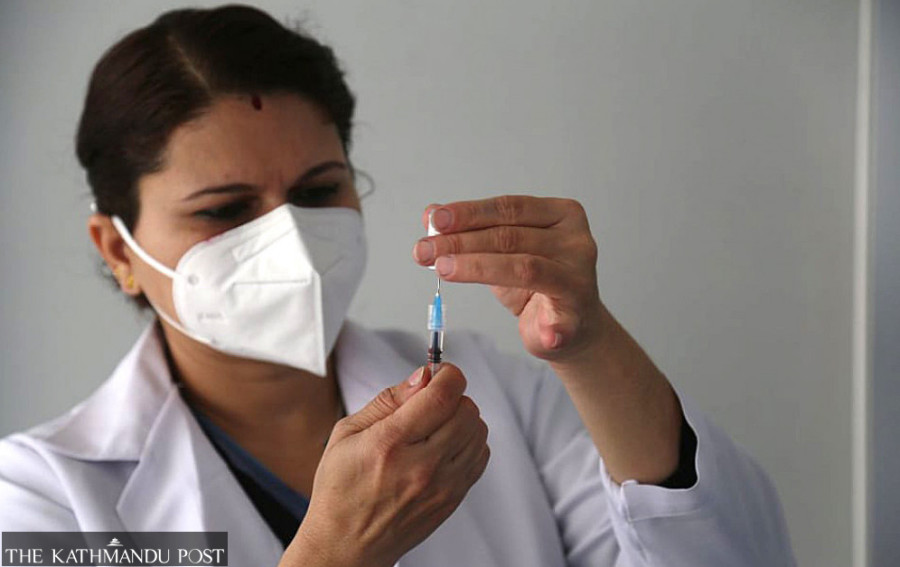Health
Covid-19 vaccination to all unlikely before local elections
It is not possible to immunise the whole of target population before the May elections due to low uptake of the Covid-19 vaccines, according to the Health Ministry.
Arjun Poudel
Officials at the Ministry of Health and Population recently held interactions with newly-elected members of the National Assembly in all seven provinces.
The aim of these programmes was to sensitise the elected representatives to increase the acceptance of health programmes including vaccination, officials said.
However, some Assembly members questioned the Health Ministry officials about the low uptake and slow vaccination pace, said a ministry official.
“They asked us why it’s taking so much time to vaccinate the entire population. Some even directed us to accelerate the pace of vaccination,” the official said, asking not to be named. “They also alerted us about the upcoming local level election.”
“It is our duty to increase the vaccination coverage, but we expect the lawmakers to understand that there are three tiers of government—federal, provincial and local—and all of them have their own individual responsibilities.”
The local level government is responsible for the vaccination programmes conducted or to be conducted in the local units.
Likewise, the Health Ministry said that the Election Commission has also directed the government to immunise the eligible population before the election day.
The government has declared local level elections on May 13.
“Yes, we have heard that the commission has directed the government to immunise the eligible population before the local level elections,” another official at the ministry, who too asked for anonymity, said. “But there are three tiers of government in existence. The responsibility of vaccinating the population lies with the local level.”
Multiple officials at the Health Ministry the Post talked to said that it is not possible to immunise all eligible people before the election due to low uptake of the Covid-19 vaccines.
“The pace of vaccination had increased due to the rise in infection rate after the third wave,” said Dr Bibek Kumar Lal, director at the Family Welfare Division. “But now it has slowed down. We have to increase the vaccination pace and coverage and immunise those who are eligible at the earliest.”
On Sunday, 88,566 people in the country took the jab. So far, 17,876,223 people or 61.2 percent of the total population, have been fully vaccinated. The Health Ministry said that 1,318,473 people have taken booster shots as of Sunday.
Experts say that most of the remaining population, who have not taken any dose of the Covid-19 vaccine, may not seek to be immunised voluntarily.
They said that the Diffusion of Innovation Theory of EM Rogers applies in health programmes also.
According to the theory, 2.5 percent of the people are innovators, who want to be the first to try innovation; 13.5 percent are early adopters who represent opinion leaders, they enjoy leadership roles and embrace change opportunities.
Meanwhile, 34 percent are in the early majority and the other 34 percent are in the late majority, according to Rogers’ theory.
The last 16 percent of the people are laggards, who are bound by tradition and very conservative. These people are sceptical of change and are the hardest group to bring on board.
Strategies to appeal to this population include statistics, fear appeal and pressure from people in other adopter groups.
“We all know that it is not easy to convince the people who have not taken any dose of the Covid vaccine yet,” said Dr Radhika Thapaliya, a risk communication expert. “Authorities first have to find out who they are, where they are and apply appropriate ways to convince them to take the jabs.”
Public health experts say authorities have failed to pay attention to multiple factors, some of them minor, that have led to a slowing down of the vaccination pace in Nepal.
In the past, people without citizenship certificates and other identity cards issued by the government were deprived of the Covid-19 vaccine.
But in the second week of February, the Health Ministry decided not to seek identity cards for Covid-19 vaccination but a majority of the general public is unaware of the new decisions.
Doctors say lack of access to vaccination centres, rumours about the side effects of vaccines; and lack of awareness, among others, are the reasons behind the slow vaccination pace.
Officials at the Health Ministry had said that they will change their strategies and mobilise health workers, seek the help of female community health volunteers, social workers, and local clubs to identify those who are yet to take a single dose of Covid-19 vaccine but no measure has been taken so far.
“Even though the task to find the remaining unvaccinated population is tough, it is not impossible,” said Dr Baburam Marasini, former director at the Epidemiology and Disease Control Division. “Authorities have to reach every household to ensure if all eligible people have been inoculated or not.”
Health Ministry officials said they are aware of the slow pace of vaccination in the country and that the interactions with the newly-elected National Assembly members in all provinces are also a part of the ministry’s new strategies to increase the acceptance rate of the health programmes including Covid-19 vaccination.
“We are aware of the risk of infections; the possible surge in new cases during the upcoming election and the everyday crowd in public places,” Dr Sangeeta Kaushal Mishra, spokesperson for the Health Ministry, said. “We will try to inoculate all the remaining unvaccinated people at the earliest.”




 11.84°C Kathmandu
11.84°C Kathmandu















